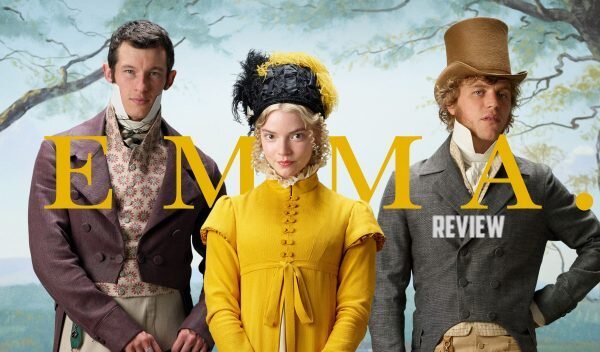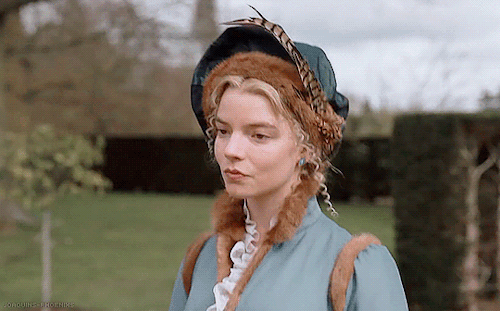Emma.: An Indulgent Cake Loaded With Icing
Director Autumn de Wilde makes her feature film debut with Emma., a chic reimaging of Jane Austen’s beloved comedy. Excellently dressed and indulgent as all get out, this period romp definitely cooks up a candy-coated visual feast, but it will take more than just looks to fully satisfy.
Handsome, clever, and rich, Emma Woodhouse (Anya Taylor-Joy) is a restless queen bee without rivals in her sleepy little town. In this glittering satire of social class and the pain of growing up, Emma must adventure through misguided matches and romantic missteps to find the love that has been there all along.
Similar to Louise Marie Alcott’s Little Women, Jane Austen’s Emma is one of those stories that’s been adapted for screen (both TV and film) and stage several times, and while it’s not quite as worn out or well known (at least to Americans) as Little Women, the adaptations of Austen’s story — with the exception of Amy Heckerling’s Clueless, which still remains the most enjoyable and inventive of the bunch — seem to always want to play it straight and follow the story as written. This may be because many consider Emma to be a perfect story, neat and tidy in its construction; however, for such a well known story as this, we think it really needs something to set it apart from the rest — like how Gerwig gave Little Women nice little touches of nuance, both in look and design. So what does this new version of Emma — stylized with a full stop period (as Emma.) as if to claim it’s the definitive version — bring to the table?
Aside from being best dressed, Autumn de Wilde’s retelling of the story isn’t afraid of showing the rougher side of Emma’s character (played brilliantly by Anya Taylor-Joy) by making her somewhat biting and unlikeable. Most adaptations try to soften her character to make her more digestible, but de Wilde and screenwriter Eleanor Catton take the opposite approach, giving audiences a new shade to a familiar character. They also draw a lot of humor out of this tale of youthful folly and give it a bit of a modern leaning, borrowing a few pages from Clueless’s book and serving as a bridge between the clever reshaping of story (AKA Clueless) and the more prim and proper period retellings.
Emma. is very much like a cake loaded up heavy with icing; it’s pretty to look — and even tasty at times — but overall, it’s lacking in nutritional value, too loaded with sugar and deceptively tasty, leading to a potential tummy ache. It’s entertaining in a momentary sense and can be counted on for a laugh, but Emma.’s foolish, high society matchmaking isn’t altogether compelling — especially by those who are not easily satisfied by tales of the rich meddling with the poor for amusement. The film has its moments though, and it’s at its best whenever it incorporates live music into the narrative (the best scene being a classical music showdown that delivers big laughs); however, its rather plain and simplistic rehashing of the story feels a bit overly long and somewhat overstays its welcome.
The costume and production design Alexandra Byrne and Kave Quinn respectively are the real stars here, and they fill the frame with sumptuous patterns and soft-hued splendor, which really give the world a tactile quality. The sunny cinematography from Christopher Blauvelt is also a plus, and it gives the film the right glow and sheen. Autumn de Wilde’s direction is very basic and paired down to the rudimentary essentials. Best known for her photography, de Wilde’s images tend to lean into the photographic, and when combined with the sets and costumes, it’s hard not view it as a vapid Vogue or Cosmopolitan shoot instead of a film. There’s really no style or swagger to de Wilde’s direction; that all rests solely on the production and costume design, and performers. For a story as completely indulgent as this, it could have benefited greatly from the grandiose visions of period pieces like The Favorite or Marie Antoinette.
Anya Taylor-Joy is pretty great though — but when is she not?! She looks the part (a mix between Scarlett Johansson, Anne Hathaway, and Liza Minnelli), poised with sophistication and able to give a nice sharp bit to the dialogue’s wit. This is at its peak when she delivers a cutting remark, which, if done well, should elicit an audible gasp from the audience. She’s also capable of expressing contradictory emotions with her face and eyes that contrast against the dialogue, which gives her portrayal an added layer. Bill Nighy is also very comfortable in his period garb as Mr. Woodhouse, and he really embraces the film’s comedic beats to deliver some of its most memorable lines.
Overall, Emma. isn’t nearly as playful or inventive as Clueless, which remains our favorite Emma adaptation, but it has the edge on the other period tellings of the story. However, as far as period pieces go (which, admittedly, aren’t exactly our preferred cup of tea), it kinda just falls somewhere in the middle, making it another film adaptation people won’t be talking about in the years to come. It’s kind of the cinematic equivalent of eating icing straight from the container; it might be fun for awhile, but that quickly passes into borderline sickness. Needless to say, this one isn’t for those will a low sugar tolerance.
Recommendation: If you’re a fan of Jane Austen’s classic or in the mood for something ravishing to enjoy with your afternoon tea, Emma. will go down smooth and entice your senses.
Rating: 3 bonnets outta 5.
What do you think? We want to know. Share your thoughts and feelings in the comments section below, and as always, remember to viddy well!



